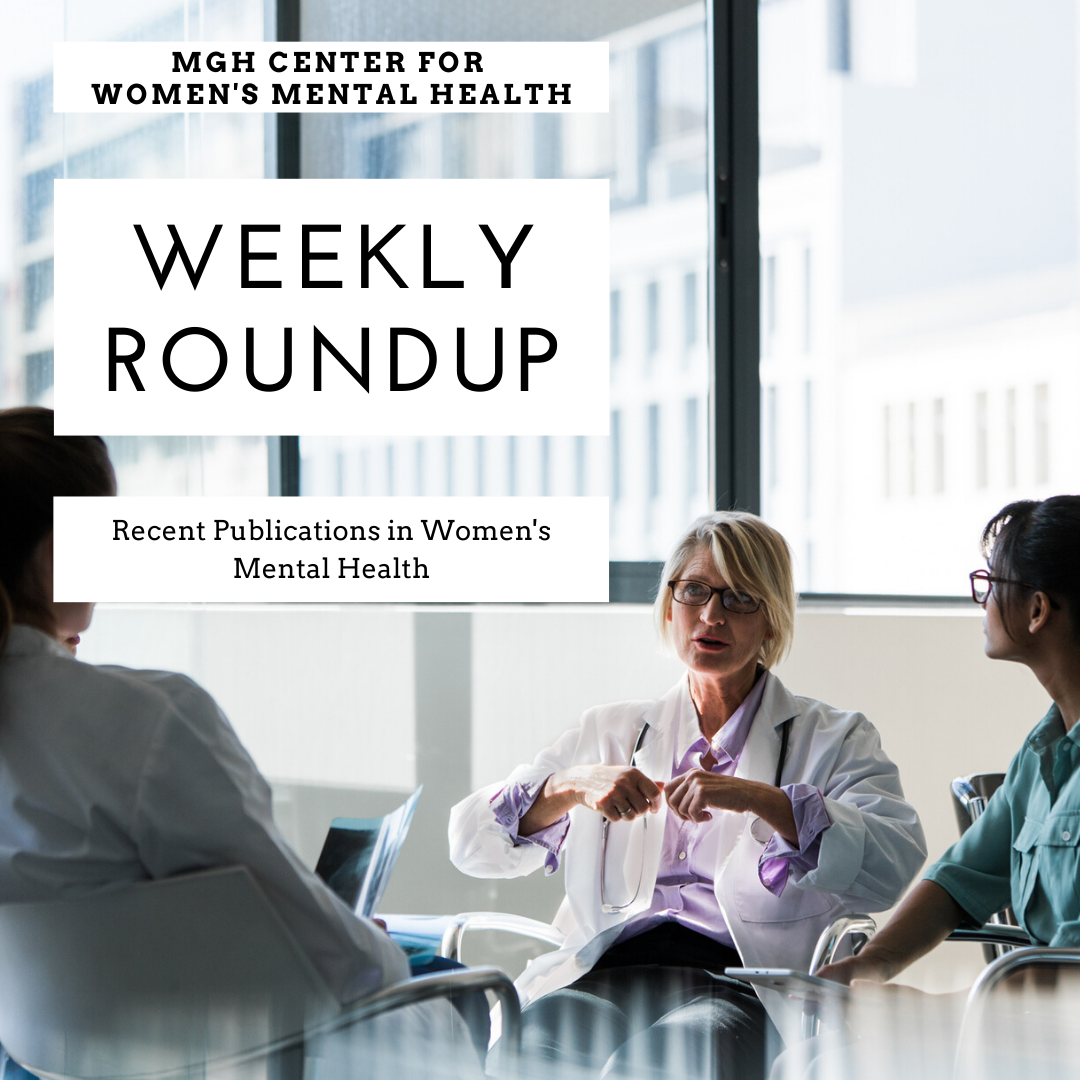
Every week we review the most recent publications in women’s mental health, covering topics related to premenstrual symptoms, perinatal mood and anxiety disorders, use of medications in pregnant and breastfeeding women, perinatal substance use, and menopausal mental health.
For more detailed descriptions of many of these topics, you can sign up to receive our weekly CWMH NEWSLETTER which comes out every Thursday.
And don’t forget to visit ESSENTIAL READS – a curated selection of up-to-date and clinically relevant articles in women’s mental health.
Ruta Nonacs, MD PhD
PMS AND PMDD |
| No articles this week |
INFERTILITY AND MENTAL HEALTH |
| Disordered eating and eating disorders among women seeking fertility treatment: A systematic review.
Hecht LM, Hadwiger A, Patel S, Hecht BR, Loree A, Ahmedani BK, Miller-Matero LR. Arch Womens Ment Health. 2022 Feb;25(1):21-32. Among women pursuing fertility treatment, rates of current eating disorders ranged from 0.5 to 16.7%, while past eating disorder prevalence rates ranged from 1.4 to 27.5%. |
PSYCHIATRIC ILLNESS DURING PREGNANCY |
| Longitudinal Changes in Sleep, Biological Rhythms, and Light Exposure From Late Pregnancy to Postpartum and Their Impact on Peripartum Mood and Anxiety.
Slyepchenko A, Minuzzi L, Reilly JP, Frey BN. J Clin Psychiatry. 2022 Jan 18; 83(2):21m13991. Free article. Specific longitudinal changes in biological rhythm parameters, most notably circadian quotient, activity during rest at night, and probability of transitioning from rest to activity at night, were most strongly linked to higher depressive and anxiety symptoms across the peripartum period. Cytokines and tryptophan metabolites can predict depressive symptoms in pregnancy. Sha Q, Madaj Z, Keaton S, Escobar Galvis ML, Smart L, Krzyzanowski S, Fazleabas AT, Leach R, Postolache TT, Achtyes ED, Brundin L. Transl Psychiatry. 2022 Jan 26;12(1):35. Free article. IL-1? and IL-6 levels were positively associated with severity of depressive symptoms across pregnancy and the postpartum. A combination of cytokines and kynurenine metabolites in the 2nd trimester had a >99% probability of accurately predicting 3rd trimester depression, with an ROC AUC > 0.8. Altogether, this work shows that cytokines and tryptophan metabolites can predict depression during pregnancy and could be useful as clinical markers of risk. Analysis of Neurodevelopmental Disorders in Offspring of Mothers With Eating Disorders in Sweden. Mantel Ä, Örtqvist AK, Hirschberg AL, Stephansson O. JAMA Netw Open. 2022 Jan 4;5(1):e2143947. Free article. Children born to mothers with eating disorders, in particular disorders that were active during pregnancy, were at increased risk of developing ADHD and ASD. The association could not be fully explained by parental psychiatric comorbidities, and among children of mothers with anorexia nervosa and bulimia nervosa, it could not be explained by unmeasured familial confounding. Green SM, Inness B, Furtado M, McCabe RE, Frey BN. J Clin Med. 2021 Dec 31;11(1):209. Free article. Improvements in generalized anxiety symptoms, worry, intolerance of uncertainty, and mood were observed at post-treatment, maintained at 3-months, and the intervention received high ratings of treatment satisfaction. |
MEDICATIONS AND PREGNANCY |
| Gestational Exposure to Antidepressant Drugs and Neurodevelopment: An Examination of Language, Mathematics, Intelligence, and Other Cognitive Outcomes.
Andrade C. J Clin Psychiatry. 2022 Jan 25;83(1):22f14388. The body of literature reviewed suggests that prenatal antidepressant exposure is indeed associated with cognitive neurodevelopmental deficits and that the deficits are attenuated or eliminated by adjustment for maternal depression and other confounds. It is suggested that the deficits that remain despite adjustment may be due to residual confounding from unmeasured behavioral and internal environment variables associated with untreated maternal depression. Meador KJ, Cohen MJ, Loring DW, May RC, Brown C, Robalino CP, Matthews AG, Kalayjian LA, Gerard EE, Gedzelman ER, Penovich PE, Cavitt J, Hwang S, Sam M, Pack AM, French J, Tsai JJ, Pennell PB; Maternal Outcomes and Neurodevelopmental Effects of Antiepileptic Drugs Investigator Group. JAMA Neurol. 2021 Aug 1;78(8):927-936. Outcomes of children at 2 years of age did not differ between children of women with epilepsy taking anti-seizure medications, mostly lamotrigine or levetiracetam, and children of healthy women. |
POSTPARTUM PSYCHIATRIC ILLNESS |
| Influence of 5-HTTLPR polymorphism on postpartum depressive and posttraumatic symptoms.
Landoni M, Missaglia S, Tavian D, Ionio C, Di Blasio P. Psychiatr Genet. 2022 Feb 1;32(1):9-14. A lower expression of serotonin transporter gene, associated with SS genotype, seems to render women more vulnerable to depressive and PTSD symptoms after childbirth. |
MEDICATIONS AND BREASTFEEDING |
| No articles this week |
PERINATAL SUBSTANCE USE |
| Association Between Prenatal Cannabis Use and Psychotropic Medication Use in Pregnant Patients With Depression and Anxiety.
Hirschtritt ME, Avalos LA, Sarovar V, Ridout KK, Goler NC, Ansley DR, Satre DD, Young-Wolff KC. J Addict Med. 2022 Jan 11. The 12.6% of patients who screened positive for prenatal cannabis use demonstrated higher odds of prenatal benzodiazepine (adjusted odds ratios [aOR] = 1.40; 95% confidence interval [CI] = 1.20-1.62) and hypnotic (aOR = 1.28; 95% CI = 1.11-1.48), but did not have a higher odds of antidepressant use (aOR = 1.05, 95% CI = 0.96-1.14). |
MATERNAL MENTAL HEALTH AND CHILD OUTCOMES |
| No articles this week |
MENOPAUSE AND MENTAL HEALTH |
| Vasomotor symptoms in midlife women with incident breast cancer: pink SWAN.
Gold EB, Crawford SL, Leung K, Greendale G, Reeves KW, Joffe H, Avis NE. Breast Cancer Res Treat. 2022 Jan;191(1):125-135. The prevalence of vasomotor symptoms peaked at 2.75 years post-diagnosis and then began to decline. |
OTHER TOPICS IN WOMEN’S MENTAL HEALTH |
| Relationship between sex hormones, reproductive stages and ADHD: a systematic review.
Camara B, Padoin C, Bolea B. Arch Womens Ment Health. 2022 Feb;25(1):1-8. The literature on the relationship between sex hormones and ADHD is limited. Available studies present contradicting information. Rate of polycystic ovary syndrome in mental health disorders: a systematic review. Douglas KM, Fenton AJ, Eggleston K, Porter RJ. Arch Womens Ment Health. 2022 Feb;25(1):9-19. There are a limited number of studies assessing PCOS in mental health samples. |



Leave A Comment